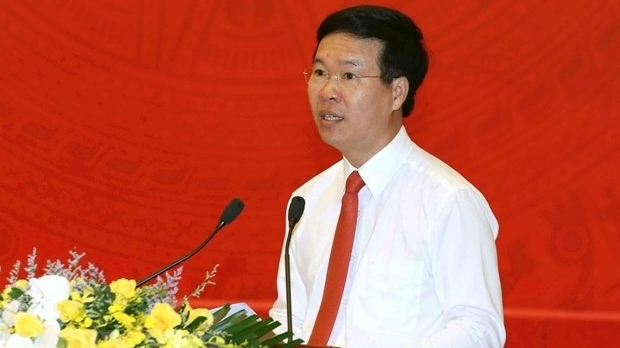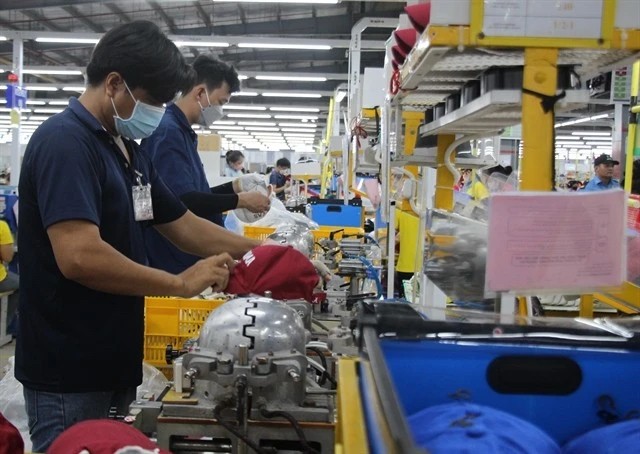Social media for political and social stability in Vietnam

Politburo member, Secretary of the Communist Party of Vietnam (CPV) Central Committee and Head of the CPV Central Committee’s Commission for Communication and Education Vo Van Thuong. (Photo: VNA)
From a video of an accordion artist expressing his dissatisfaction with the tax policy published on social media in late 2018, "Yellow Shirt Movement" strikes have caused a constant crisis during the past months in France. The movement has spread rapidly because of the dispersal of the call on social networks which sparked anger and became riots, far beyond the original goal of provoking protests against the tax policy.
Looking back "colour revolutions" or violent riots in recent decades, it is easy to see that social media has ignited such movements which led street movements to violence and consequently weakened regimes in Eastern Europe, the Middle East, North Africa, and Latin America.
Social media and fake news have become keywords that makes many people think of violent street riots affecting Europe and the world over recent years. In the United States, after the protests against Wall Street (in 2011), politicians criticised Facebook and Twitter as "tools of riots". The Western press also mentions the method of using social media to create volatile "crowds" and taking advantage of incidents, accidents, and deaths to create riots.
Social media, particularly social networks, are continuously supported by new technologies, with more convenient features, becoming an important channel to promote social communication and connections. Social media platforms can establish communities operating in various forms that can attract thousands to millions of members without limits in geography and social class.
The quick access to inpidual users creates many opportunities and benefits for information to be spread quickly while containing complex and unpredictable dangers which can cause profound pision and incite hatred in social communities, especially in multi-ethnic and multi-religious countries.
Yuval Noah Harari did not exaggerate the overall global anxiety by saying that social networks and the Internet is “a land of freedom and lawlessness that undermines national sovereignty, ignores borders, destroys privacy and brings about the most frightening threat of global security”.
With multi-dimensional effects, social media surpasses official media and challenges technical and administrative management measures of all countries, especially developing countries.
People say that Facebook is a big "country" and it certainly has information of its "citizens" much more than any other governments. When "data on the Internet" is a resource and information is power, we have a basis to worry that the owners of information will create new risks while amplifying other withstanding risks. How to manage information ownership has become the most important political question in this era.
Amid existing challenges and potential risks, it requires the rethinking of the way to manage cyberspace and countries are making hectic preparations to establish protection barriers by delivering hard measures.
In the context of increasing instability in many regions in the world, Vietnam’s political and social stability is an important advantage for national development, helping the country gain significant achievements over the past 30 years of renewal and becoming an attractive destination for foreign investors.
Media and social media play a crucial role in creating solidarity, consensus and confidence among the people, contributing to political and social stability over the past years.
Like other countries around the globe, Vietnam is taking advantage of and promoting the preeminent characteristics of social media, while also facing negative impacts that are difficult to control from this new form of communication.
The "ecosystem" of social media has formed KOLs (Key Opinion Leader) and influencers who have "brands" or whose information and opinions are influential and shared by "netizens" and spread quickly on a large scale. They are mostly active subjects who contribute to creating a healthy information life. But, it also has revealed KOLs and influencers who have negative motives, low cultural background, dissatisfaction with the regime, or even being law violators, but they know how to "evoke bad emotions" and direct public opinion to seek profit from businesses and intimidate and insult inpiduals and organisations.
The deviation in the awareness of political, economic, cultural and social issues will lead to blunders in behaviour, creating risks of security, political and social instability. Many people believe that social networking is virtual and they will not be responsible for their speeches and conduct. That psychology combined with inadequacies in the management capacity of authorities make the distribution of bad information becomes easy and dangerous.
Recent studies have shown that fake news, hate speeches, defamatory statements, discriminations on race, religion and gender, aggressive behaviours have become more alarming. These misleading behaviours cannot only provoke personal and institutional crises, but also register a death of businesses.
The negative impacts from social media can lead to immediate consequences, but in the long term they can cause breakdowns in cultural and ethical values, which thereby affect the political and social stability of the country. Sociologists say that people who spend too much time on social network, especially for young people, can be "isolated from real society", "distracted from real-world relationships", even cognitive bias and violations of law. In the long term, it is possible to hurt social cohesion and make it difficult to create consensus in solving common problems facing the community, nation and humanity.
Social media is becoming an increasingly complex front that hostile forces are taking advantage of to incite "colour revolution” elements in Vietnam. Lessons from the "colour revolution" show that it is necessary to proactively identify and prevent factors that take advantage of social media to provoke political and social instability from many directions and different ways.
This requires proper perception of social media in both positive and negative aspects in order to take proper measures to promote its progressive values, which are recognised by the community, while driving back its negative impacts on the society.
First, it is necessary to enhance guidance and direction and strict management of online newspapers, social network and other forms of communications on the internet. Therefore, functional agencies must stay alert in assessing and forecasting the situation so that pressing issues will not be turned into “hot spots” and negative trends in the internet. Political opportunists and behaviours of self-evolution and self-transformation must be strictly handled at the same time.
Second, attention should be paid to promoting institutionalisation and management as well as to completing legal system on social media. Network operators and service providers operating in Vietnam must accept the responsibilities for observing the country’s laws and respecting its sovereignty interests and security. Meanwhile, the Law on Cyber Security must be fully implemented to handle acts of spreading fake news and disinformation on distorting and opposing the Party, State on the internet and social network.
Third, the mainstream press must foster its active, pioneering and leading role in providing information in the digital era. Thus, the implementation of the Press Law 2016 must be reviewed in order to complete legal environment for the operation of the press. It is also important to enhance training for journalists to help them equip themselves with qualification, skills and ethics, particularly when joining social networks.
Fourth, technological and technical solutions should be applied to keep up with the development of the internet and social network. The application of technology should be promoted in order to timely detect and handle wrongful information, which can harm to the social and political security.
Last but not least, it is crucial to raise public awareness of legal regulations and responsibility in joining social information platform. All citizens, particularly young people and students should equipped themselves with proper skills on protecting personal information and processing information.
In addition, it is needed to promote the role of organisations and inpiduals, particularly admins of website, blogs and fanpages; KOLs; influencers; and young people in building a healthy environment on the internet and social media.
Creating a healthy and safe information environment where social media is one of the important sources of information, will positively and effectively contribute to protecting political and social stability, serving as a foundation for the country’s sustainable development.
VNF ( NDO )
Recommended
 National
National
Vietnam News Today (Jun. 6): Foreign Investment in Vietnam Surges in Five Months
 National
National
Vietnam News Today (Jun. 5): PM sets off for attendance at UNOC 3 in France, official visits to Estonia, Sweden
 National
National
Vietnam News Today (Jun. 4): Vietnam - Promising Candidate for Southeast Asia’s Next Powerhouse
 National
National
Shangri-La Dialogue 22: Vietnam Highlights Some Issues of Ensuring Stability in a Competitive World
Popular article
 National
National
Vietnam News Today (Jun. 3): PM Pham Minh Chinh to Attend UN Ocean Conference, Visit Estonia, Sweden
 National
National
Vietnam News Today (Jun. 2): Vietnamese Trade Mission Sounds Out Business Opportunities in United States
 National
National
Vietnam News Today (Jun. 1): Vietnamese, Japanese Firms Foster Partnership
 National
National



